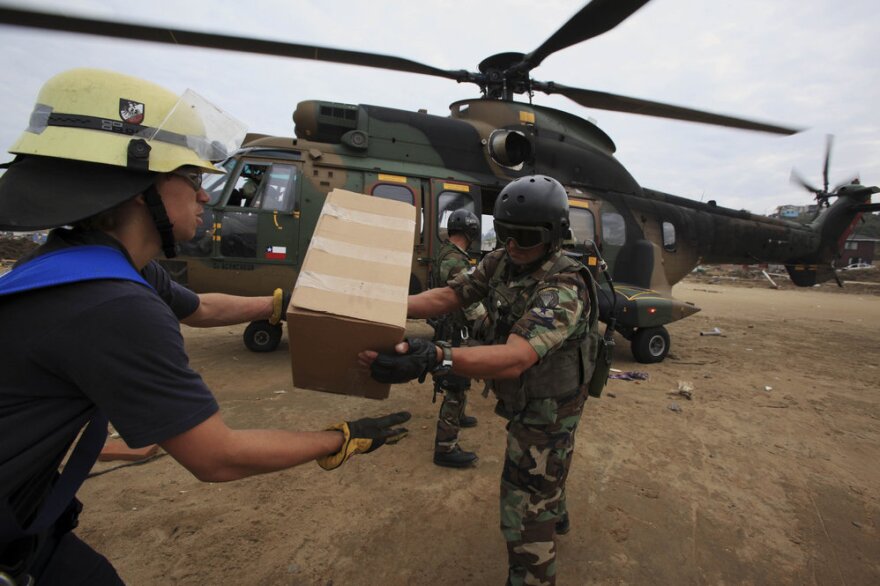The toll from Chile's devastating earthquake rose dramatically Sunday as the country's president announced that at least 708 people were killed, a growing number of people were missing, and hundreds of thousands were left homeless.
President Michelle Bachelet told a news conference that Chile faces "a catastrophe of such unthinkable magnitude that it will require a giant effort" for the country's recovery. She mobilized the army to assist police in trying to halt looting.
Fearing aftershocks from Saturday's massive 8.8 magnitude earthquake, Chileans camped outside as rescue workers dug through rubble searching for survivors.
Earlier Sunday, officials had placed the death toll at 300, but the number seemed sure to rise as reports began filtering in from around the country.
Chile's national TV quoted unnamed disaster officials as saying that 350 people were killed in the town of Constitucion, with at least some of the deaths caused by the tsunami waves that crashed ashore shortly after the quake struck.
Rescuers were trying to reach survivors in a toppled 15-story apartment block in Concepcion, the largest city near the epicenter.

Shattered roads and airports were hampering relief and rescue efforts in the city of 200,000, about 330 miles southwest of the capital, Santiago, where damage has also been significant. Highways have been destroyed, bridges collapsed and power is still out in much of the central part of Chile. Insurance companies have estimated the damage at about $30 billion.
After the initial quake, there have been dozens of aftershocks, including one nearly as powerful as the Haiti earthquake in January.
Chile's ambassador to the U.S., Jose Goni, described the devastation as "enormous." In an interview with NPR's Weekend Edition Sunday, Goni said that while the affected area made up about one-quarter of the narrow country's geography, the earthquake struck in a part of Chile that was home to 80 percent of the population.
Secretary of State Hillary Clinton is heading to Latin America on a previously scheduled weeklong, five-nation tour, including Chile. She is expected to arrive in Chile late Monday and will offer support for disaster rescue and recovery efforts.
Bachelet, who leaves office on March 11, said the country would accept some of the offers of aid that have poured in from around the world.
She said Chile needs field hospitals and temporary bridges, water purification plants and damage assessment experts — as well as rescuers to help relieve workers who have been laboring frantically since the quake struck before dawn Saturday.
In Concepcion, the university was among many buildings that caught fire as gas and power lines snapped. Many streets were littered with rubble from edifices, inmates escaped from a nearby prison, and police warned that criminals had been looting stores, witnesses said.
On Sunday, police used tear gas and a water cannon to disperse a crowd that forced its way into a supermarket seeking food and home goods. One woman said that, given the desperate circumstances, residents had no other choice.
To strip away any need for looting, Bachelet announced that essentials on the shelves of major supermarkets would be given away for free, under the supervision of authorities. Soldiers and police will also distribute food and water, she said.
Bachelet also said a curfew was being imposed from 9 p.m. to 6 a.m. and only security forces and other emergency personnel would be allowed on the streets. Police vehicles drove around announcing the curfew over loudspeakers.
Rescue efforts were concentrated at a collapsed apartment building that trapped an estimated 60 people. Rescuers clung to hopes of bringing at least some of them out alive.
"It fell at the moment the earthquake began," said 4th Lt. Juan Schulmeyer of Concepcion's 7th Firefighter Company, pointing to where the foundation collapsed. A full 24 hours later, only 16 people had been pulled out alive, and six bodies had been recovered.
Throughout Chile, 1.5 million people were affected, authorities said. Some 500,000 homes were severely damaged by the quake in one of the most powerful in recent decades. Its force, estimated at 500 times that of the earthquake that hit Haiti in January, could be felt 1,000 miles away in Brazil.
NPR's Jason Beaubien, in neighboring Argentina, said local reports were describing some smaller towns near the epicenter as having "disappeared from the map."
The quake-triggered tsunami wave that hit Talcanhuano, northwest of Concepcion, swept boats ashore and into the town, washing away entire streets, Beaubien said, quoting reports.
The quake struck early Saturday, jolting many Chileans from their sleep. It spawned a nearly 10-foot tsunami that quickly hit the Chilean coast and caused authorities to issue tsunami warnings to 53 nations in the Pacific region. Those warning were lifted later Saturday and early Sunday.
But for hours, anxious residents of Hawaii braced for a potentially killer wave that turned out to be less severe than predicted.
Gerard Fryer, a geophysicist at the Pacific Tsunami Warning Center in Hawaii, said the maximum wave height that reached Hawaii was "about half" the 7 feet predicted.
At least five people are reported dead and more were missing after a town on Robinson Crusoe Island, off from the Chilean coast, was swamped by the tsunami.
NPR correspondent Jason Beaubien, freelance journalists Heidi Chang and Richard Reynolds, and The Associated Press contributed to this report.
Copyright 2022 NPR. To see more, visit https://www.npr.org. 9(MDAzMjM2NDYzMDEyMzc1Njk5NjAxNzY3OQ001))






















